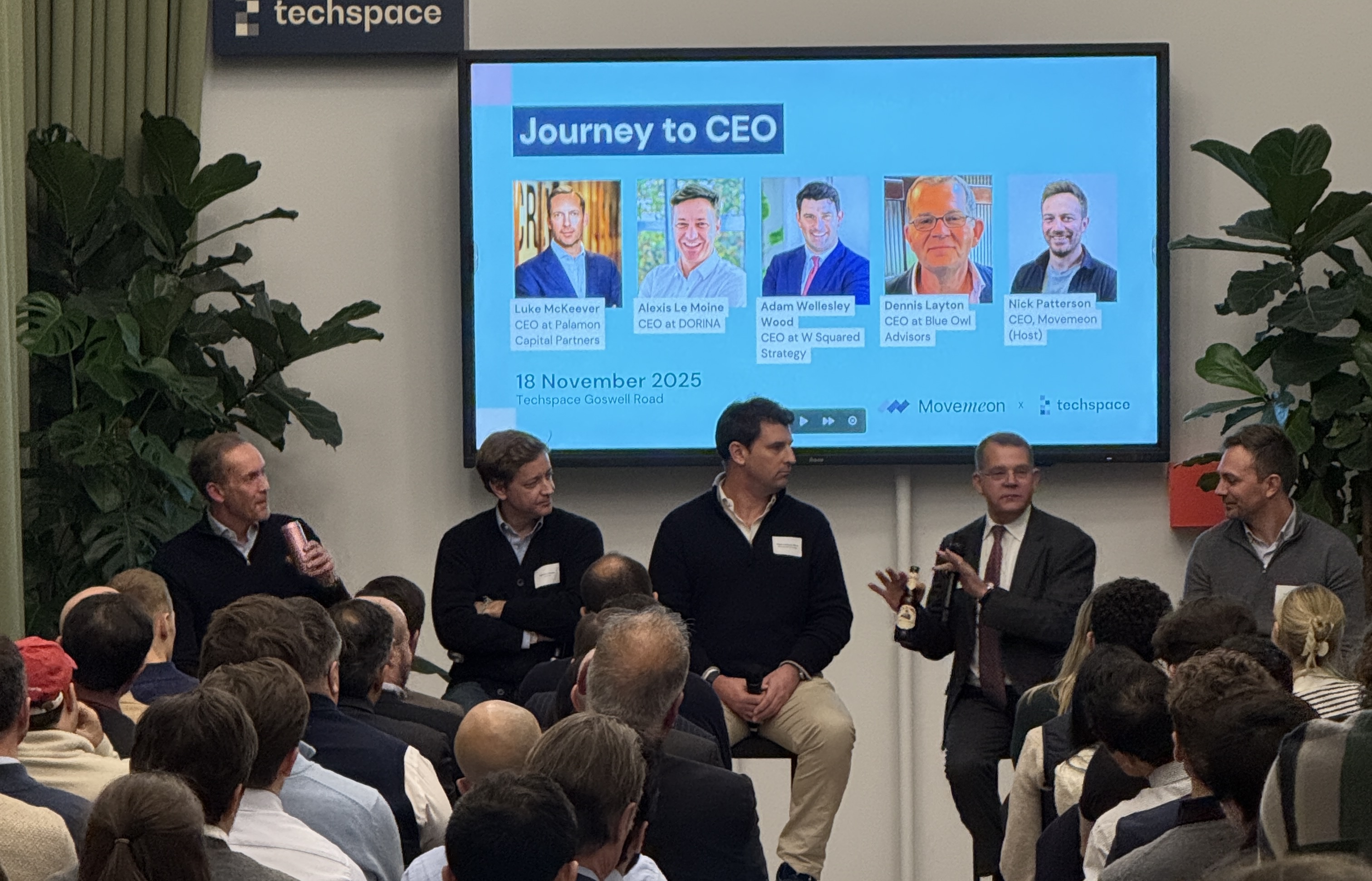What is it like to be a Chief of Staff?

Table des matières
Balises
Abonnez-vous à notre newsletter
Aidan Curran trod a familiar path before becoming a Chief of Staff. After graduating from business school, he spent three years in strategy consulting for LEK. He then made the shift into the industry to join Penfold, a workplace benefits and pension management platform.
In just over a year and a half with the company, Aidan has gained valuable insight on the ever-changing nature of the Chief of Staff role, one which has transformed as the company itself has grown.
https://www.youtube.com/watch?v=uFn809qJ_vQ&t=24s
How would you summarise the Chief of Staff role?
It’s really dependent on the company you’re at, their stage and size. I’ve been here for 18 months. In that time we’ve grown from 25 to just over 80. Also the role has changed drastically as the company has changed.
Right now I have three broad areas of responsibility. First: if we’ve got a genuinely new venture or idea, that doesn’t have a BAU functional team responsible for it, I’ll investigate whether there’s an opportunity there and understand what it would take to run with that going forward.
Secondly, I help out in the functional teams themselves, either leading on a project or jumping in with a team that’s under-resourced. Finally, I play a broad support function for the business, managing our People and Office Manager and taking the day to day lead on our finance and accounting function.
Interested in becoming a Chief of Staff? Register as a candidate on Movemeon.com and view all open CoS roles.
What was it like when you first started?
It was very different. It now feels quite structured and grown up compared to when I joined. Now, I’m more like an extension of the founding team, making the leadership team as effective as possible, shaping OKRs at the company level. That’s really a reflection of the fact that with 25 people 18 months ago it was very founder-driven. Whereas now it’s a much more mature business with clearer functional leadership and established managerial processes.
Was the OKR structure in place when you joined?
No, we’ve been doing it for 6-9 months now, and we’re still iterating on the way we do it, but it’s absolutely integral to the alignment between our teams now. On an accountability level, there’s so much stuff that we could be doing that just nailing down the 2 or 3 really important things we want to move the dial on in that quarter, and focusing on those key metric ladders up to the entire business doing well.
How is your working relationship with your founders?
A lot changed since I joined. Now, every other week we have an hour in the diary to go through my priorities, how I’m getting on with my own personal OKRs, anything that I need help unblocking and how I'm progressing.
But also, I’ll talk with one of the founders on the phone at least once a day. The other is in the office most days so there’s a pretty organic checking in.
What skills does an effective Chief of Staff need?
There are four big areas that are really important. All closely related, and all very much relating to a consulting background.
One is prioritisation. You need to be able to understand the context you find yourself in, the opportunities and problems which you face, and be able to make sure that you are doing the most impactful thing with the finite amount of time you have. You’ve got so many things you could be doing, so many problems to solve, that making sure that you’re doing the most impactful ones is super important.
Then there is problem solving. Although we’re a pretty small business, a lot of the problems we’re tackling are still very complex. Being able to walk into a situation, understand all the moving parts, and really get to the bottom of what’s causing a problem or finding areas to improve is really important.
Click here to find over 200 jobs on Movemeon!
Organisation is massive. Consulting might seem fast-paced, but really you’re on one project at a time, it’s all very hierarchical and clear in terms of what needs doing, by whom, and when. It pales in comparison to being across all the context of a business and juggling all the things that are happening there. So being absolutely on top of really basic things like your inbox, your to-do list and your objectives is really important.
The fourth attribute, but by no means the least important, is strong EQ. Often if you’re helping someone address a problem, they’ll have been working on that area for a very long time. They might have been the first person to start doing sales or operations in this business. If you come in and tell them they’ve done 17 different things wrong, that’s incredibly aggravating and incredibly blind to the context, which is probably a brilliant generalist trying to do something from scratch for the first time. It’s no good telling them what the problem is: they probably already know that. So being really sensitive and not throwing around any intellectual plays or being unnecessarily unclear, just rolling your sleeves up, being sensitive, and just trying to be helpful, is so important.
What type of person is best suited to being a Chief of Staff?
It’s a really good question! I think you need to be very organised, and very relaxed with a slightly chaotic style, particularly if you’re going to work closely with founders and trusted with their most important topics and challenges. This is their job, but they’re also staking something so much bigger on this by taking the risk of running a business. So all the things they’re trusting you with are really big topics. They’ll throw around a lot of ideas and different problems, some of which are going to be felt very intensely. You need to be quite relaxed about it.
To summarise, you need to be organised as well as emotionally resilient. I imagine that if you found it stressful to have lots of things going on at once and not be able to get all of them done, it would be quite difficult.
What are the best aspects of being a Chief of Staff?
It’s a bit like consulting in that I don’t have very many fixed remits, it’s all quite project based. I really like the continuation of being involved in lots of different stuff, for quite short periods of time, and then seeing them through to completion. There’s very little monotony and routine, so that’s really positive.
I love the feeling of involvement in shaping an entire business. In consulting you might be involved in a big five year strategy planning exercise, but whether that was still being used six months after you left, you don’t really know. In a start-up, you’re making very big decisions and you’re involved in conversations at a very high level around what this business is going to do. And because it’s so small, you see that stuff happening as soon as you walk out of the meeting. So the level of impact you’re having is massive.
Consulting can be quite a homogenous environment with lots of similar types of people. I really like working around lots of different types of people. It’s incredibly refreshing to see people with real domain expertise, functional expertise, and very different ways and working styles from me, and to be able to learn from them. I’m finding that a hugely enriching part of my job.
Any final thoughts on being a Chief of Staff?
I so infrequently take a step back and reflect, so I miss all the positive things. Every 3-6 months when I do performance reviews there’s some self-reflection, but week by week, if I haven’t hit all my to do list or something massive came up and everything got reprioritised, you always feel like you’re fighting an uphill battle and it’s incredibly stressful. But if you take a step back and think about what you’ve achieved and the impact you’ve had it feels absolutely massive.
So taking a step back, separating the day to day, minute by minute stress and intensity of the role, and reflecting on all the positive things you’re getting out of it is something that I have to remind myself to do. I’d advise anyone considering the role to do the same. And the fact that you have to do that is also indicative of what the role is like!
Interested in hiring a Chief of Staff for your team? Get in touch with one of our experts.
[hubspot portal="25392842" id="24161966-77f0-499d-9230-0f71cee62bf7" type="form"]
About the author: Dan McEvoy is a freelance writer and editor, with extensive experience in finance, technology, HR, recruitment, and marketing content.
Where Talent Meets Opportunity
Our exclusive network use us to find job that fit their skills, and thousands of Employers trust us to hire exceptional talent. Choose the path that matches your goals - start exploring or start hiring.
Nos derniers articles
Nous publions régulièrement des articles actualisés pour vous tenir au courant de l'actualité du marché et de notre travail.
.png)
A record quarter for Private Equity deals sees a sharp hardening in the hiring market
Talent supply tightens as PE demand surges: Inside Q4’s hardest hiring market in two years, where Private Equity accelerates, scale-ups hold steady, and Large Enterprises struggle to attract strategy and transformation talent.

What we can all learn from Private Equity about talent - McKinsey, HBR and our analysis
Private Equity has become one of the most influential forces in business, outperforming public companies through disciplined value creation and exceptional talent strategy. This article explains how PE achieves its results and why demand for ex-consulting talent is rising across the industry.
Joignez-vous à notre offre exclusive communauté mondiale
Recevez des données et des informations exclusives sur les salaires, l'analyse comparative, et des entretiens avec l'industrie pour bâtir une carrière qui vous convient.
Créez un compte dès aujourd'hui et commencez à rechercher des rôles dans moins de cinq minutes.





